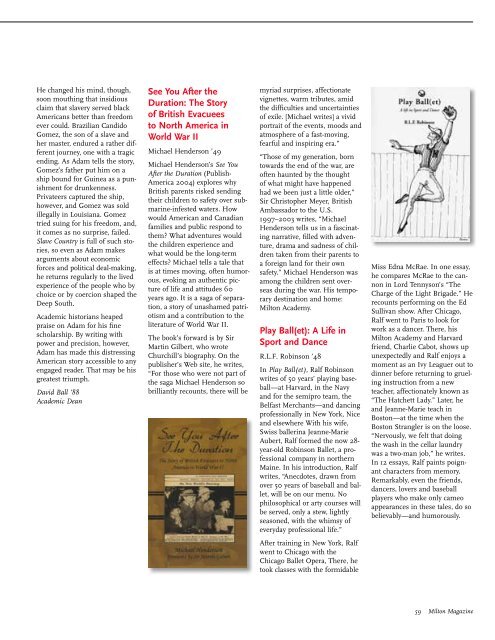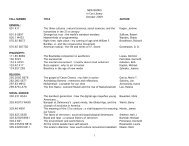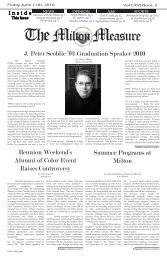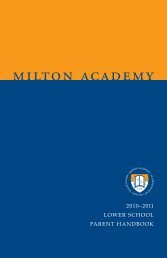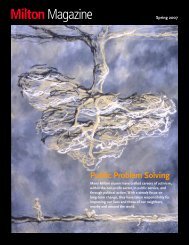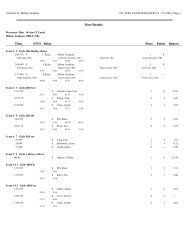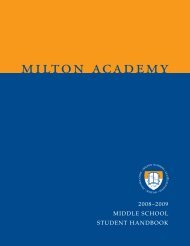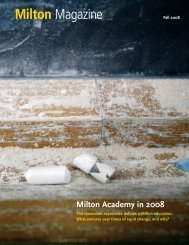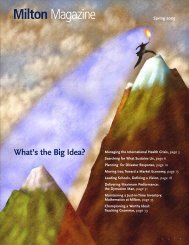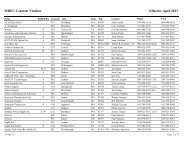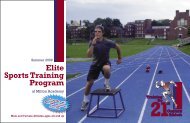Alumni AuthorsRecently published worksSlave CountryAdam Rothman ‘89“Why did slavery expand in theearly national United States?”Adam Rothman ‘89 begins histightly argued Slave Country withthat deceptively simple question.Adam contends that slavery didnot merely linger after 1776 as aregrettable national embarrassment.Rather, the institutionflourished in unanticipatedways, as the slave populationmore than tripled in the 50 yearsafter independence. Adam focuseson the Deep South, where thegrowth and evolution of slaverymay have been most pronounced.In 1790, Americans,Europeans and NativeAmericans still struggled forcontrol over the region, but by1820, Louisiana, Mississippi andAlabama had each entered theUnion. Those three states producedone-quarter of the nation’scotton crop in 1820. By then,Adam argues, the region hademerged as “the leading edge ofa dynamic, expansive slaveregime incorporated politicallyinto the United States and firmlytied to the transatlantic systemof commodity exchange.” On theeve of the Civil War, of course,over 60 percent of the nation’scotton came from those threestates and close to one-third ofthe nation’s slaves lived there.The expansion of slavery in theDeep South had already shapedthe nation’s destiny.Rejecting the notion that there isone simple explanation for suchrapid and important change,Adam instead argues that “contingentglobal forces, concretepolicies pursued by governments,and countless smallchoices made by thousands ofindividuals” shaped slavery’sexpansion and evolution. Adammakes his case in clear, cleanlanguage, deftly synthesizingwhat at first appear to be widelydisparate types of evidence.For example, he shows that theevolution of international cottonand sugar markets both encouragedthe explosion of cotton productionin the Deep South andsustained the great wealth ofLouisiana’s sugar planters. Aspowerful as those market forceswere, however, Adam does notcast Americans, black or white,as helpless, nameless victims ofimpersonal economic forces. Infact, in the central chapter of thebook, Adam explores the complicatedrelationship betweensouthern leaders during the Warof 1812 and the institution thatso many of them sought to preserve.The story seems straightforwardat first. AndrewJackson’s defeat of the Red Stickmovement in the Creek War ledto the cession of 23 million acresof the Creeks’ land. Many whiteAmericans soon flocked to thatand other territory once controlledby Native Americans, andmany of those white Americanscompelled their slaves to jointhem. Jackson’s subsequent victoryover the British in NewOrleans further consolidatedAmerican control of the region.European and Native Americanfoes proved to be no matchfor the expansion of Americanslavery.Yet as Adam points out, the storyof the War of 1812 is not so simple.In the eyes of at least someAmericans, the war that ultimatelyadvanced the interests ofslaveholders seemed to put thevery institution at risk. SomeAmerican slaveholders believedthat the British would foment aslave rebellion, and in NewOrleans slaveholders stepped uppatrols to squelch any incipientinsurrection. Yet when theBritish threat became real, politicaland military leaders ultimatelycame to rely on the labor ofAfrican Americans. New Orleansorganized a militia of free menof color (commanded by whites,of course), a militia that servedenthusiastically in the war. Theplanters around New Orleansalso allowed the city to use theirslaves to build the military fortifications.Slaves, each a possiblerebel, each a possible British ally,ultimately proved essential indefending the growing institutionof slavery, the very source oftheir oppression.Andrew Jackson figures prominentlyin the later chapters, butit is Thomas Jefferson as visionaryand as president to whomAdam returns time and again.Jefferson’s dreams of the West,his purchase of Louisiana, andhis writings on slavery makehim a critical figure, and congressionalchoices about theslave trade, land sales, tariff policy,and the admission of newstates put national policy at theheart of Adam’s story. Still,Adam includes the stories of theless famous. Ethan Allen’sgrandson, it turns out, soughtwarmer climes, migrating fromVermont to Alabama. He initiallyinsisted that slavery was notnecessary for financial success.58 <strong>Milton</strong> Magazine
He changed his mind, though,soon mouthing that insidiousclaim that slavery served blackAmericans better than freedomever could. Brazilian CandidoGomez, the son of a slave andher master, endured a rather differentjourney, one with a tragicending. As Adam tells the story,Gomez’s father put him on aship bound for Guinea as a punishmentfor drunkenness.Privateers captured the ship,however, and Gomez was soldillegally in Louisiana. Gomeztried suing for his freedom, and,it comes as no surprise, failed.Slave Country is full of such stories,so even as Adam makesarguments about economicforces and political deal-making,he returns regularly to the livedexperience of the people who bychoice or by coercion shaped theDeep South.Academic historians heapedpraise on Adam for his finescholarship. By writing withpower and precision, however,Adam has made this distressingAmerican story accessible to anyengaged reader. That may be hisgreatest triumph.David Ball ’88Academic DeanSee You After theDuration: The Storyof British Evacueesto North America inWorld War IIMichael Henderson ’49Michael Henderson’s See YouAfter the Duration (Publish-America 2004) explores whyBritish parents risked sendingtheir children to safety over submarine-infestedwaters. Howwould American and Canadianfamilies and public respond tothem? What adventures wouldthe children experience andwhat would be the long-termeffects? Michael tells a tale thatis at times moving, often humorous,evoking an authentic pictureof life and attitudes 60years ago. It is a saga of separation,a story of unashamed patriotismand a contribution to theliterature of World War II.The book’s forward is by SirMartin Gilbert, who wroteChurchill’s biography. On thepublisher’s Web site, he writes,“For those who were not part ofthe saga Michael Henderson sobrilliantly recounts, there will bemyriad surprises, affectionatevignettes, warm tributes, amidthe difficulties and uncertaintiesof exile. [Michael writes] a vividportrait of the events, moods andatmosphere of a fast-moving,fearful and inspiring era.”“Those of my generation, borntowards the end of the war, areoften haunted by the thoughtof what might have happenedhad we been just a little older,”Sir Christopher Meyer, BritishAmbassador to the U.S.1997–2003 writes, “MichaelHenderson tells us in a fascinatingnarrative, filled with adventure,drama and sadness of childrentaken from their parents toa foreign land for their ownsafety.” Michael Henderson wasamong the children sent overseasduring the war. His temporarydestination and home:<strong>Milton</strong> <strong>Academy</strong>.Play Ball(et): A Life inSport and DanceR.L.F. Robinson ’48In Play Ball(et), Ralf Robinsonwrites of 50 years’ playing baseball—atHarvard, in the Navyand for the semipro team, theBelfast Merchants—and dancingprofessionally in New York, Niceand elsewhere With his wife,Swiss ballerina Jeanne-MarieAubert, Ralf formed the now 28-year-old Robinson Ballet, a professionalcompany in northernMaine. In his introduction, Ralfwrites, “Anecdotes, drawn fromover 50 years of baseball and ballet,will be on our menu. Nophilosophical or arty courses willbe served, only a stew, lightlyseasoned, with the whimsy ofeveryday professional life.”After training in New York, Ralfwent to Chicago with theChicago Ballet Opera, There, hetook classes with the formidableMiss Edna McRae. In one essay,he compares McRae to the cannonin Lord Tennyson’s “TheCharge of the Light Brigade.” Herecounts performing on the EdSullivan show. After Chicago,Ralf went to Paris to look forwork as a dancer. There, his<strong>Milton</strong> <strong>Academy</strong> and Harvardfriend, Charlie Cabot, shows upunexpectedly and Ralf enjoys amoment as an Ivy Leaguer out todinner before returning to gruelinginstruction from a newteacher, affectionately known as“The Hatchett Lady.” Later, heand Jeanne-Marie teach inBoston—at the time when theBoston Strangler is on the loose.“Nervously, we felt that doingthe wash in the cellar laundrywas a two-man job,” he writes.In 12 essays, Ralf paints poignantcharacters from memory.Remarkably, even the friends,dancers, lovers and baseballplayers who make only cameoappearances in these tales, do sobelievably—and humorously.59 <strong>Milton</strong> Magazine
- Page 3 and 4:
283440Journalism at Milton24 Studen
- Page 6 and 7:
One piece of AOL programming that h
- Page 8 and 9:
puter) and read a piece. Bored? Pro
- Page 10 and 11: decrease in the amount spent on res
- Page 12 and 13: “The biggest change is corporatei
- Page 14 and 15: Jesse Sarles ’93“It’s a flexi
- Page 16 and 17: Felicia Taylor ’82Ned Roberts ’
- Page 18: “I don’t go through a lot of me
- Page 21 and 22: This summer, Peter was in the midst
- Page 23 and 24: Ty Burr ’76“On one level what I
- Page 25 and 26: Later, she enjoyed stints at Workin
- Page 27 and 28: were what to get into at Milton. Ma
- Page 29 and 30: Charlie Riggs, Abby Padien-Havens,
- Page 31 and 32: They say that the tough part was th
- Page 33 and 34: Co-editors of La Voz, 2005:Emma San
- Page 35 and 36: In its three to four annual issues,
- Page 37 and 38: 6 Sam Minkoff ’06 andJamal Sabky
- Page 39 and 40: Student graduation speakers Tanner
- Page 41 and 42: The Robert L. Daley PrizeCreated by
- Page 43 and 44: 1 Llewellyn Howland ’552 Derick F
- Page 45 and 46: 11 Robin Robertson with the MiltonM
- Page 47 and 48: The Head of SchoolMilton’s Magazi
- Page 49 and 50: I began to inventory the sensations
- Page 51 and 52: Hadley Davis Rierson ’89speaking
- Page 53 and 54: Emmy Norris is a prowler for “cul
- Page 55 and 56: A collection of symbols, none more
- Page 57 and 58: Middle School Tackles Complex Probl
- Page 59: Gratwick Performersdents prior to t
- Page 63 and 64: Creating Cityscapes:Third-grade stu
- Page 65 and 66: New Roles for Milton Faculty Member
- Page 67 and 68: Hugh R. SilbaughUpper School Princi
- Page 69 and 70: Academy. Jorge was singularlyfocuse
- Page 71 and 72: There are many variations foreach s
- Page 73 and 74: Class of 1950, front row (left to r
- Page 75 and 76: Class of 1955, front row (left to r
- Page 77 and 78: Class of 1980, holding banner (left
- Page 79 and 80: Class of 1990, front row (left to r
- Page 81 and 82: Class of 1995, front row (left to r
- Page 83 and 84: Margaret Creighton WilliamsMargaret
- Page 85 and 86: The Lexi Rudnitsky Poetry Projectsp
- Page 87 and 88: Milton AcademyBoard of Trustees, 20


